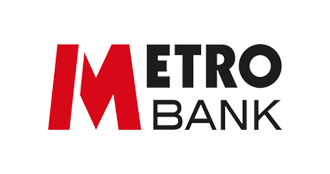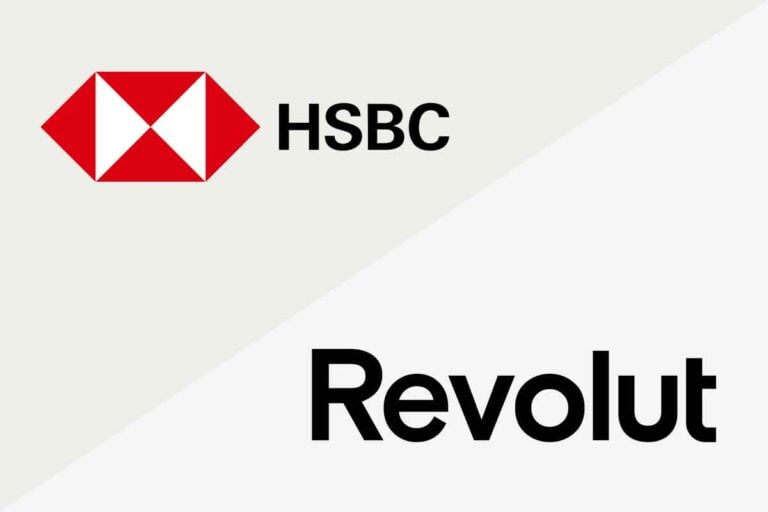Choosing a banking partner for your business is a critical decision, as it impacts your day-to-day operations and future growth. In this article, we compare two financial giants, HSBC vs Revolut, that have set robust footprints in the UK business banking landscape.
With traditional and digital banking platforms represented, we provide a detailed analysis of their features, pros and cons, fees, and standout elements to guide your choice.
HSBC vs Revolut
| Features | HSBC | Revolut |
|---|---|---|
| Business current accounts | Yes | Yes |
| Digital banking | Yes | Yes |
| FX services | Yes | Yes |
| Business credit cards | Yes | No |
| Business loans | Yes | No |
| Overdraft services | Yes | No |
| Business savings accounts | Yes | No |
| International payments | Yes | Yes |
| Accounting integration | Yes | Yes |
| Invoicing services | Yes | Yes |
| Payroll services | Yes | No |
| Cash & cheque handling | Yes | No |
| Free ATM withdrawals | Yes (Terms Apply) | Yes (Terms Apply) |
| Business insurance services | Yes | No |
| Term deposits | Yes | No |
| Customer service | Phone, Email, In-person | Phone, Email, Live Chat |
| App-based banking | Yes | Yes |
| Free transactions | Limited | Limited |
| Business advice services | Yes | No |
| Regulated by FCA | Yes | Yes |
| Access to physical branches | Yes | No |
 | Tide Business Bank Accounts ✓ Free, Plus, or Pro Account ✓ iOS & Android Mobile App ✓ Upload & Auto-Match Receipts Pricing Trial period Contact | |
 | Card One Money ✓ No Credit Checks ✓ Simple Fees ✓ Up To 3.5% Cashback Pricing Trial period Contact | |
 | ANNA Money ✓ Apply In 10 Minutes ✓ Bookkeeping & Payroll Tools ✓ User-Friendly Mobile App Pricing Trial period Contact | |
 | HSBC Business Banking ✓ Business Current Account ✓ In-Branch, Online & App Banking ✓ FSCS Protected Pricing Trial period Contact | |
 | Metro Business Banking ✓ Business Current Account ✓ High Street Presence ✓ FSCS Protected Pricing Trial period Contact | |
 | Mettle Business Banking ✓ Business Bank Account ✓ Online & App ✓ Quick & Easy Application Process Pricing Trial period Contact | |
 | Monzo Business Banking ✓ Business Current Account ✓ Dedicated mobile app experience ✓ FSCS Protected Pricing Trial period Contact | |
 | Virgin Money ✓ Business M Account ✓ In-Store, Online & App Banking ✓ Insights & Forecasting Platform Pricing Trial period Contact |
HSBC
HSBC is a longstanding giant in the financial services industry, offering a comprehensive suite of banking solutions for businesses. They have an extensive global reach, providing clients with a vast network and local expertise in various markets.
Pros and cons
Pros
- Diverse offerings: HSBC offers a comprehensive set of financial products, from current and savings accounts to loans, credit cards, and business insurance, catering to a wide range of business needs.
- International reach: With operations across the globe, HSBC is ideal for businesses with international operations or ambitions.
- Physical branches: Presence of physical branches offers face-to-face customer service, and cash & cheque handling.
- Strong regulatory framework: As an established bank, HSBC is heavily regulated, offering clients high levels of security and assurance.
Cons
- Less competitive on digital front: While HSBC does offer online banking services, their digital platform isn’t as advanced or user-friendly as that of many digital-first banks like Revolut.
- Fee structure: HSBC tends to have a higher fee structure compared to digital banks due to higher overhead costs.
Fees and charges
| Services | HSBC |
|---|---|
| Account maintenance | Varies based on account type |
| Domestic payments | Free |
| International payments | £4 – £30 |
| Overdraft | Varies based on account type and limit |
| ATM withdrawals | Free (limits apply) |
| Business credit cards | £32 annual fee |
| Cash & Cheque handling | Fee applies, varies depending on volume |
Unique and standout features
HSBC provides a comprehensive set of offerings tailored to different business needs.
Their business advice services and access to international markets make them unique, catering particularly to businesses with global operations or those intending to scale internationally.
Their commitment to sustainability, with products like green loans, also sets them apart.
Revolut
Revolut is a digital-first bank offering innovative, app-based financial solutions. With a focus on low fees and user-friendly technology, they aim to provide a seamless banking experience for businesses.
Pros and cons
Pros
- Cost-effective: Revolut typically offers lower fees due to its lean digital business model.
- User-friendly digital platform: Revolut’s app-based banking is seamless, offering a highly intuitive interface and features such as instant notifications.
- Flexibility and convenience: Revolut offers real-time payment tracking, spending categorisation, and the ability to hold and exchange different currencies.
- Quick setup: The account setup process is swift and easy, requiring minimal paperwork.
Cons
- Limited product offering: As a digital bank, Revolut doesn’t offer products such as business loans, credit cards, and overdraft services.
- No physical branches: Some businesses might find the lack of physical branches inconvenient, especially those dealing with cash and cheques.
Fees and charges
| Services | Revolut |
|---|---|
| Account maintenance | Free for basic, fees apply for higher tiers |
| Domestic payments | Free |
| International payments | Free up to £5,000/month, then a 0.5% charge |
| ATM withdrawals | Free up to £200/month, then 2% fee |
| Invoicing services | Free |
Unique and Standout Features
Revolut’s modern approach to banking is their standout feature.
Their app allows businesses to hold, receive, and exchange different currencies with ease, ideal for companies dealing with international transactions.
Integration with accounting software makes managing finances more efficient, and their instant notifications help businesses keep a real-time check on their spending.
Conclusion – HSBC vs Revolut
Choosing between HSBC and Revolut depends on your business’s specific needs.
HSBC’s diverse offerings, global reach, and physical branches make it ideal for larger, international businesses or those requiring a broad spectrum of banking services.
In contrast, Revolut’s digital-first model, user-friendly platform, and cost-effectiveness make it a suitable choice for small to medium enterprises and digitally-oriented businesses.
FAQ
Both banks can serve small businesses, but Revolut’s digital platform and lower fee structure might be more appealing for smaller enterprises.
HSBC offers a broader range of services, including business loans, credit cards, and business insurance.
Account setup is generally faster with Revolut due to their digital-first model.
Both banks offer customer service, but Revolut provides 24/7 support through their digital platform.
Revolut does not currently provide cash and cheque handling services.
Yes, HSBC provides business advice services, which could be beneficial for companies looking to scale or navigate complex financial decisions.

